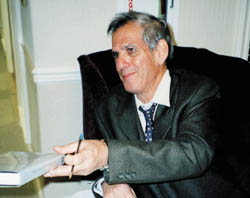By Barlow Der Mugrdechian
Hye Sharzhoom Advisor
 Dr. Yair Auron, senior lecturer at The Open University of Israel and the Kibbutzim College of Education, was the guest of the Armenian Studies Program as part of its Fall Lecture Series on Wednesday, November 15. The presentation was held in the new Smittcamp Alumni House.
Dr. Yair Auron, senior lecturer at The Open University of Israel and the Kibbutzim College of Education, was the guest of the Armenian Studies Program as part of its Fall Lecture Series on Wednesday, November 15. The presentation was held in the new Smittcamp Alumni House.
The purpose of his talk, “The Banality of Indifference: Attitudes of the Jewish ‘Yishuv,’ the Zionist Movement, and the State of the Israel towards the Armenian Genocide,” was to summarize and analyze the positions of the Jewish Yishuv (the Jewish community of Palestine prior to the establishment of the State of Israel), the Zionists and also the position of the Israeli government toward the massacres committed by the Turkish government against the Armenians during the First World War.
In his research, Auron utilized never before published documents and eye-witness accounts from World War I. These now have been published as part of his latest 400 page book, The Banality of Indifference: Zionism and the Armenian Genocide, (Transaction Publishers, 2000). Composed of ten chapters, the book opens new grounds for research on the Armenian Genocide and reveals the feelings and attitudes of Jews towards the Genocide.
According to Auron, his book raises “theoretical and philosophical questions, particularly in the introduction and final two chapters, which relate directly and indirectly to the specific subject of our research: the debate over the concept of genocide and the uniqueness of the Holocaust in comparison to other instances of genocide, including the Armenian Genocide.”
During his talk, Auron specifically addressed a series of questions on the Armenian Genocide that he called “difficult and delicate.” These included: 1) Who perpetrated the Genocide of the Armenians? 2) Who knew about it? and 3) What was the role of the Germans?
He also compared the similar characteristics of the Jews and Armenians, in particular noting the fates of the two peoples. But he also pointed out that the Jews succeeded in surviving the rule of the Ottomans in Palestine, while the Armenians suffered a Genocide.
His research is the result of his own ongoing effort, in his own words, to “examine a subject that has been repressed and ignored in the Israeli historical and collective memory, as well as in the collective memory of the world.” “I was troubled by a sense of oppressive discomfort and criticism of the evasive behavior, verging on denial, of the various governments of Israel regarding the memory of the Armenian genocide,” Auron said.
On the eve of World War I, there were some 85,000 Jews out of a population of 700,000 in the area of Palestine (Eretz Yisrael) west of the Jordan river. Half of the Jews were part of the “Old Yishuv” and half were part of the “New Yishuv,” immigrants who had arrived at the end of the nineteenth century and the beginning of the twentieth.
According to Auron, “Yishuv knew about the fate of the Armenians, and feared a similar fate.” The evidence suggests that they knew what was happening to the Armenians in the Ottoman Empire. Mordecai Ben-Hillel Hacohen, a Jewish journalist in the Yishuv, reported on the chain of events affecting the Armenians of the Ottoman Empire as early as 1916.
Aaron Aaronhnson, a high official in the local Ottoman administration and the leader of the Nili spy group, was also aware of reports by US Ambassador Henry Morgenthau as well as the compilation work by James Bryce and Arnold Toynbee regarding the fate of the Armenians. Auron devotes a significant chapter is his book to “The Forty Days of Musa Dagh: Symbol and Parable.” Franz Werfel’s novel influenced many young people who grew up in Palestine in the 1930s.
“For many Jewish youth in Europe, ‘Musa Dagh’ became a symbol, a model, and an example, especially during the dark days of the Second World War,” Auron said. “Jews in particular have lauded Werfel’s book and have sometimes emphasized the author’s Jewishness claiming that ‘only a Jew could have written this work.’”
“Recognizing the Armenian Genocide is of a major historical, moral and educational significance.” He added that such recognition is essential “for the non-recurrence of similar instances in the future,” Auron said. He described the attitude of the various Israeli governments to the Armenian Genocide as “characterized by evasiveness and denial.”
“The State of Israel has officially refrained from relating the Genocide. A combination of factors connected with Israel’s relations with Turkey and concepts of the uniqueness of the Shoah [Holocaust] have brought about an almost total absence of any mentioning of the Armenian Genocide on state television,” he said.
There are members of the Israeli government, such as Justice Minister Yossi Beilin, who share Auron’s feeling that it is a moral imperative for Israelis to be more aware of and sensitive to other occurrences of genocide.
Auron went on to say that he believed it essential to “develop a greater sensitivity among our youth to the suffering of others and to strengthen universal, humanistic values which are an integral part of the Jewish tradition.” In this regard, he noted the statement of Israeli’s Minister of Education Yossi Sarid at an April 24, 2000 memorial gathering of the Armenian community in Jerusalem which concluded with a commitment to ensure that the Armenian Genocide be included in the Israeli secondary school history curriculum.
Dr. Auron’s has been touring North America to promote the publication of his book, The Banality of Indifference: Zionism and the Armenian Genocide, whose translation from Hebrew into English was sponsored by the Zoryan Institute. The book was described as “pioneering research” by the former prime minister of Israel Shimon Peres.
 Hye Sharzhoom Armenian Action
Hye Sharzhoom Armenian Action